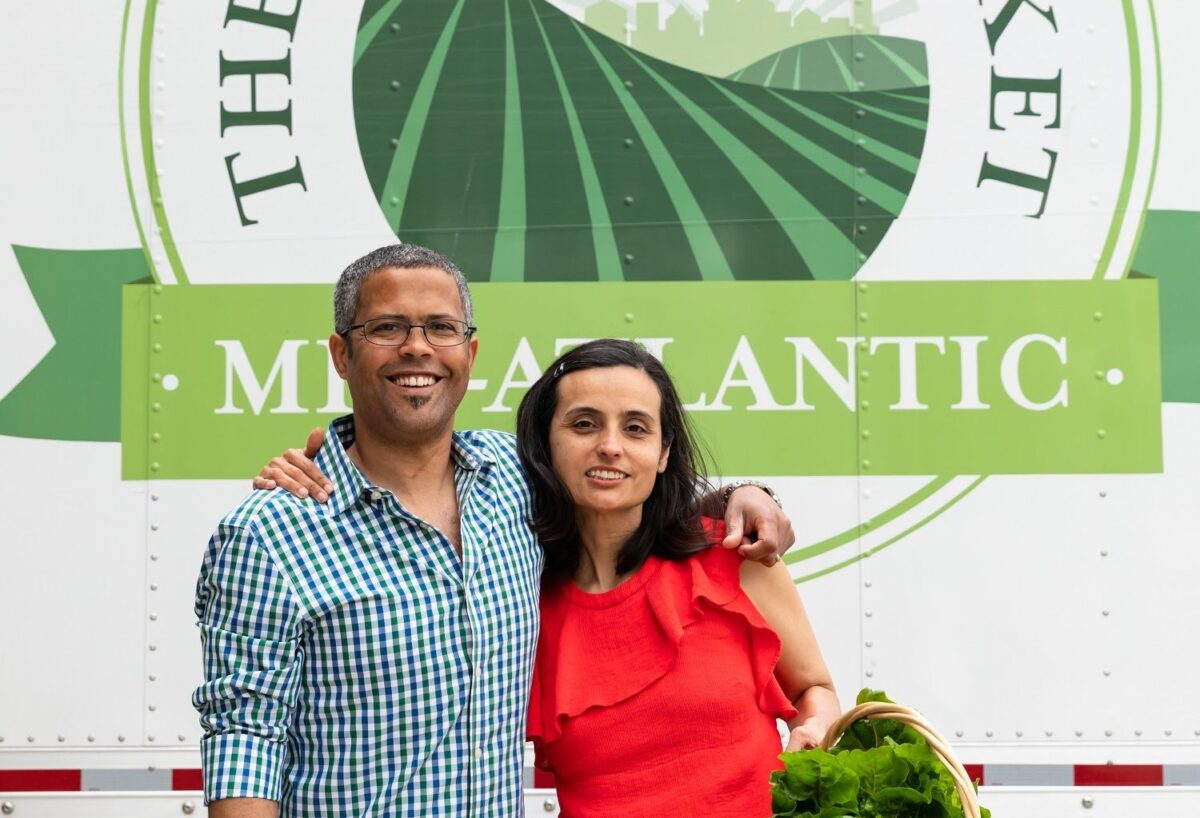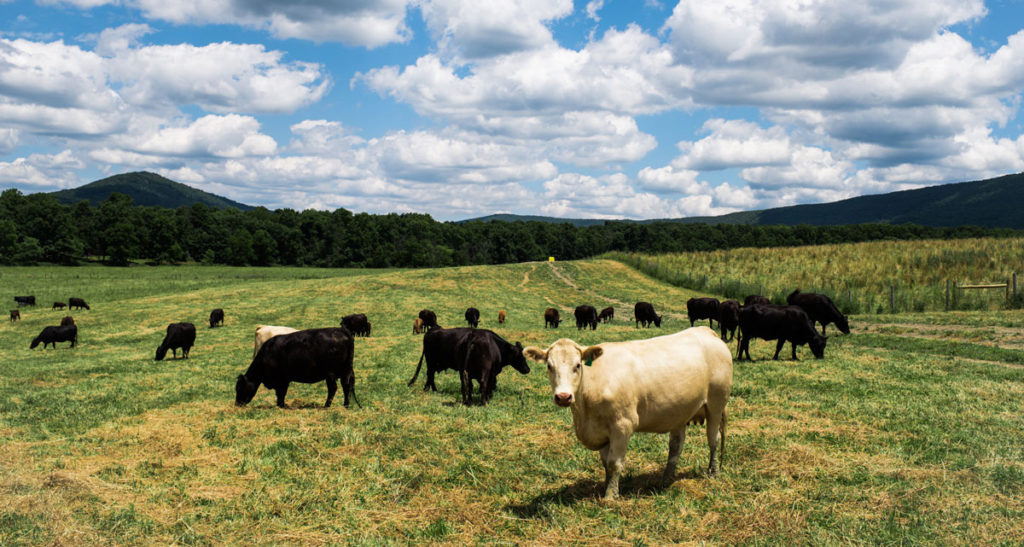Farm to Fork Profile: Bon Appétit and The Common Market: The Story of an Ever-Expanding Partnership
- by Peter Todaro

Haile Johnston and Tatiana Garcia-Granados. Photo credit: The Common Market
In 2010, the Bon Appétit Management Company team at the University of Pennsylvania struck up a partnership with The Common Market, a new non-profit organization dedicated to building sustainable and equitable local food systems. The brainchild of husband-and-wife duo Haile Johnston and Tatiana Garcia-Granados, The Common Market was in its infancy, with just one delivery vehicle and $100,000 in revenue in their first year.
Nearly 15 years later, Bon Appétit and The Common Market have grown together, with Bon Appétit-served colleges, universities, cultural institutions, and corporate headquarters sourcing from The Common Market in Pennsylvania, New York, Georgia, Texas, Illinois, and beyond. Here’s the story of how the partnership, centered around shared values, grew from one metro region on the East Coast to span half of the United States.
The Birth of Common Market
The Common Market was created after Haile and Tatiana, who, as new residents of Philadelphia’s Strawberry Mansion neighborhood, were struck by the food insecurity plaguing their community. During a visit to a produce auction outside the city, they noticed that small, local farmers had limited access to markets, which kept them from selling their produce to consumers who needed it most.
This insight formed a kernel of inspiration, and they went on to leave their corporate jobs to create The Common Market with the goal of connecting food producers with consumers in Philadelphia, especially those in food-insecure neighborhoods. This mission-driven food distributor aggregates produce, dairy, artisanal products and more from growers and artisans, giving chefs and other wholesale buyers a one-stop-shop to purchase local products.
From the beginning, Haile and Tatiana recognized the importance of establishing relationships with “anchor institutions” — large, mission-driven entities like universities and hospitals whose stable and recurring purchases provided a solid financial foundation for the organization. Working closely with these institutions, The Common Market helps chefs switch entire product categories away from broadline distributors and toward locally grown and made products. This strategy has been a success at Penn, with the team placing weekly standing orders for all of Penn’s yogurt, chicken, and select culinary staples, sourced exclusively from local producers.

Grass-fed cattle, raised in Pennsylvania and sold through The Common Market.
The Common Market Finds a Home in Atlanta
Common Market’s success in Philadelphia led to its expansion to the Southeast. In 2016, The Common Market Southeast opened its doors in Atlanta, GA, where the organization’s mission-driven approach and anchor institution model made it the ideal partner for the Bon Appétit at Emory University team.
Leading The Common Market Southeast is Executive Director Bill Green, who has worked with Campus Retail General Manager Julie Mulisano and Campus Executive Chef Nick Walker to develop a model for mission-driven procurement at Emory with a focus on supporting farmers of color. Bill and The Common Market have assisted these farmers in building capacity, assisting with obtaining GAP (Good Agricultural Practices) certification, and of course, gaining access to markets.
As in the Northeast, the Emory team places standing orders with The Common Market Southeast, indicating the quantity of certain products they intend to purchase each week. With the Bon Appétit team giving advance notice of purchases to The Common Market, farmers can more easily calibrate their supply with anticipated demand, knowing they will have stable and recurring purchases from Bon Appétit. “Standing orders really help to build more transparency for our growers,” says Rachel Terry, director of partnerships for the organization. “It’s a great way for The Common Market and our customers to show up for them.”
Moving into New Territories
In recent years, The Common Market has established a presence in Texas, partnering with Bon Appétit at St. Edward’s University. The organization also acquired Chicago-based Local Foods, allowing for the launch of The Common Market Great Lakes.
The Common Market now works with two Bon Appétit teams who serve leading technology firms in Chicago. Just like at other locations, their commercial business helps to fund mission-driven food access work. As Partnership Director Jamie Proctor explains, “the food that Bon Appétit accounts receive gets delivered to food pantries every week on the same truck.”
The ease of ordering has saved time for busy Bon Appétit chefs in the Chicago area when swapping in Farm to Fork products. “We value our partnership with The Common Market,” says Adam Dittmer, a sous chef at a technology account, “Their platform is easy-to-use and helps us align with Bon Appétit and our client’s sustainability initiatives,” he says.
According to Jamie, The Common Market Great Lakes can already serve much of Illinois, Indiana, and Wisconsin and soon plans to expand its deliveries to Michigan, setting the stage for another phase of growth.
A Vision for the Future
The Common Market continues to expand into new regions and strengthen its relationships with growers, institutions, and foodservice companies like Bon Appétit. And the organization continues to support its growers in new and innovative ways. “We have begun offering zero-interest loans to some of our growers,” says Rachel Terry. “We build access for smaller growers by giving them 50% of the value of the crops they plan to sell to us at the beginning of the growing season.”
Sometimes, these loans support investment in manufacturing, helping to make the local food system more resilient by building capacity. “At Frecon Farms, we have helped build a new packaging line,” remarks Rachel. “We can really de-risk some of these decisions because we know our farmers so well.”
The Common Market’s success gives the organization hope for their future — and the future of our food system. “After the pandemic, there was a lot of recognition by policymakers about how fragile and broken the food system is,” says Rachel. “We have been able to help bring on more diverse, small growers who can help solve these problems and meet the needs of wholesale markets for years to come.”